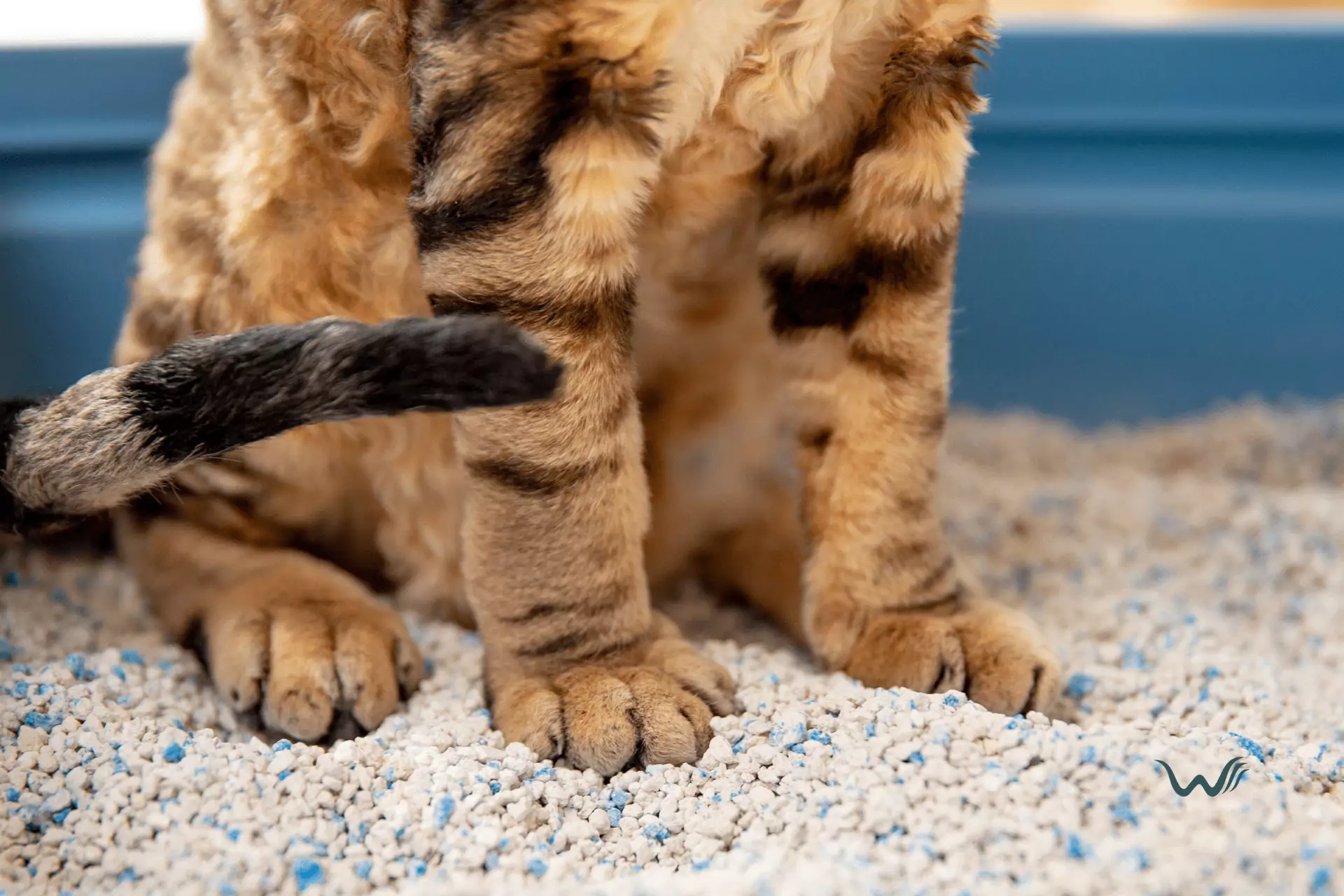

Why Is My Cat Eating Litter?
by Haley Mills
Last updated: April 23, 2024
Verified and Approved by:
Angela Morris,
MSW, LCSW
Fact Checked

If you’ve noticed your cat engaging in the peculiar behavior of eating litter, you may be wondering why they’re doing it. While it may seem strange and even concerning, there are several potential reasons why your feline companion is exhibiting this behavior.
Understanding the underlying causes can help you address the issue and ensure your cat’s well-being.
First and foremost, recognize that cats are complex creatures with unique behaviors. They may engage in certain actions that seem puzzling to us, but often these behaviors can be traced back to their instincts and natural inclinations.
In the case of litter eating, there are a few possible explanations. It could be a sign of a medical issue, such as a nutritional deficiency or an underlying gastrointestinal problem. Stress and anxiety can also play a role in this behavior, as cats may resort to unusual actions as a coping mechanism.
Lastly, environmental factors, such as the type of litter being used or the presence of other animals, can contribute to a cat’s inclination to eat litter. By diving deeper into these potential reasons, we can gain a better understanding of why cats engage in this behavior and take appropriate measures to address it.
Key Takeaways
- Cats may eat litter due to medical issues, stress, and environmental factors.
- Eating litter is not a sign of nutritional deficiency in cats.
- Consuming litter can have serious health consequences for cats, including gastrointestinal blockage or toxicity.
- Providing alternative chewing options and creating a calm environment can help discourage litter eating behavior.
Understanding the Behavior of Cats
Cats, being curious creatures, may sometimes exhibit peculiar behaviors like eating litter, which can be fascinating to observe and understand. However, not all cats engage in this behavior, which can cause cat owners to be concerned.
There are a few common misconceptions about cat behavior that may help shed light on why some cats eat litter. One misconception is that cats eat litter because they lack a particular nutrient in their diet. While it’s true that cats have specific dietary needs, eating litter is not a sign of nutritional deficiency. Cats are obligate carnivores, meaning their bodies are designed to thrive on a diet high in animal protein. If a cat is not getting the proper nutrients from their food, they may exhibit other signs such as weight loss or a dull coat, rather than eating litter.
Another misconception is that cats eat litter as a form of play. While cats are known for their playful nature, eating litter is not a typical play behavior. Cats may engage in playful activities such as batting at toys or pouncing on imaginary prey, but eating litter is not a natural part of their play repertoire.
To create a cat-friendly environment and discourage litter-eating behavior, it’s important to provide mental and physical stimulation for your cat. This can include offering appropriate toys for play, providing scratching posts for exercise and territory marking, and engaging in interactive play sessions with your cat.
Additionally, ensure that your cat has a clean litter box that is easily accessible and away from their food and water bowls. This will help to minimize any potential stress or discomfort that may lead to litter-eating behavior.
Understanding the behavior of cats can help shed light on why some cats may engage in peculiar behaviors like eating litter. By dispelling common misconceptions and creating a cat-friendly environment, cat owners can help ensure their feline companions lead happy and healthy lives.
Potential Medical Reasons for Litter Eating
One potential reason for a cat consuming litter could be due to an underlying medical condition. Cats may eat litter if they have certain nutritional deficiencies or are experiencing behavioral issues.
Nutritional deficiencies can occur when a cat’s diet lacks essential vitamins and minerals. In some cases, cats may eat litter in an attempt to supplement their diet with these missing nutrients. It is crucial to ensure that your cat receives a balanced and nutritious diet to prevent this behavior.
Behavioral issues can also contribute to a cat eating litter. Cats are known to exhibit pica, a condition where they have a strong urge to eat non-food items. This behavior can be caused by stress, anxiety, or boredom. If a cat is feeling stressed or anxious, they may turn to eating litter as a way to cope with their emotions. Similarly, if a cat is bored and lacks stimulation, they may eat litter as a form of entertainment.
If your cat is eating litter, it is crucial to consult with a veterinarian to rule out any underlying medical conditions. They can perform a thorough examination and run tests to determine if any nutritional deficiencies or other health issues may contribute to this behavior. Additionally, they can provide guidance on how to address any behavioral issues and provide recommendations for a balanced diet that meets your cat’s nutritional needs.
Stress and Anxiety as Possible Triggers
If your feline friend seems to be munching on litter, it could indicate they feel stressed or anxious. Cats are known to engage in a behavior known as pica, which is the consumption of non-food items. In some cases, this behavior can be triggered by stress or anxiety.
When anxious or stressed, cats may exhibit abnormal behaviors such as excessive grooming, aggression, or even litter consumption. There are several dietary implications to consider regarding a cat eating litter. Some litter brands may contain ingredients that are appealing to cats, such as clay or corn. Cats may also be attracted to the texture of the litter, especially if it is similar to their food.
However, it’s important to note that consuming litter can have serious health consequences for your cat, including gastrointestinal blockage or toxicity if the litter contains harmful substances. Therefore, it’s crucial to address the underlying stress or anxiety causing this behavior.
To help alleviate stress and anxiety in your cat, several behavioral modification techniques can be implemented. First, try to create a calm and peaceful environment for your cat. Provide them with a designated space where they can retreat and feel safe. Additionally, engaging in interactive play sessions with your cat can help relieve stress and provide mental stimulation.
You can also consider using pheromone diffusers or calming sprays to create a soothing atmosphere. If the litter consumption behavior persists, it’s recommended to consult with a veterinarian or animal behaviorist who can provide further guidance and support.
Environmental Factors to Consider
It’s a good idea to consider environmental factors when trying to understand why a cat might be consuming litter.
One possible factor to consider is dietary considerations. Cats are obligate carnivores, meaning they require a diet high in animal protein. If a cat’s diet lacks essential nutrients, they may be more inclined to seek out alternative sources of nutrition, such as consuming litter. Ensure that your cat’s diet is balanced and meets their nutritional needs. Consulting with a veterinarian can help you determine if your cat’s diet is appropriate and if any dietary changes need to be made.
Another important environmental factor to consider is litter box cleanliness. Cats are known for their cleanliness and prefer a clean and well-maintained litter box. If the litter box is dirty or has a strong odor, it may deter the cat from using it and lead to them seeking out other locations, including consuming litter. Regularly scooping the litter box and changing the litter as needed can help maintain a clean and inviting environment for your cat. Additionally, some cats may prefer certain types of litter, so experimenting with different options to find one that your cat is comfortable with may also be beneficial.
By considering these environmental factors, such as dietary considerations and litter box cleanliness, you can help address the issue of your cat consuming litter.
However, if the behavior persists or worsens, consult with a veterinarian to rule out any underlying medical conditions and to receive further guidance on how to address the issue best.
Tips for Addressing Litter Eating Behavior
Addressing litter-eating behavior in cats can be challenging, but there are effective strategies to discourage this behavior. One approach is to provide alternative chewing options for your cat. Cats may engage in litter-eating behavior due to a lack of appropriate outlets for their natural chewing instincts. By offering your cat safe and appropriate items to chew on, such as chew toys or dental treats, you can redirect their chewing behavior away from the litter box. This can help satisfy their chewing needs and reduce their desire to consume litter.
Another strategy is to supervise your cat’s litter box usage. Cats may develop the habit of eating litter if they feel stressed or anxious while using the litter box. By observing your cat’s behavior during litter box visits, you can identify any signs of discomfort or anxiety.
If you notice any issues, such as your cat digging excessively or appearing tense, addressing the underlying cause of their stress may be helpful. This could involve providing a more private or quiet location for the litter box, or addressing any conflicts with other pets in the household. Creating a calm and comfortable environment for your cat during litter box usage can help reduce their inclination to eat litter.
In Summary
If you find that your cat is eating litter, it is crucial to understand the underlying reasons for this behavior. While it can be a cause for concern, it’s often a sign of an underlying issue that needs to be addressed.
Rule out any potential medical reasons for this behavior, such as nutrient deficiencies or gastrointestinal problems. A visit to the veterinarian can help determine if any underlying health issues need to be addressed.
Stress and anxiety can also contribute to a cat’s litter eating behavior. Cats are sensitive animals and can easily become stressed by environmental or routine changes. Providing a calm and secure environment for your cat, along with plenty of mental and physical stimulation, can help alleviate any stress or anxiety they may be experiencing.
Furthermore, considering the environmental factors in your cat’s litter box setup is essential. Ensure the litter box is clean, comfortable, and easily accessible for your cat. Experimenting with different types of litter and litter box designs may help find a set-up your cat is comfortable with. Additionally, providing multiple litter boxes in different locations can help reduce competition or territorial issues contributing to the litter-eating behavior.
In conclusion, addressing your cat’s litter eating behavior requires a comprehensive approach that includes ruling out medical issues, addressing potential stress or anxiety triggers, and creating an optimal litter box environment. By understanding and addressing the underlying factors contributing to this behavior, you can help ensure the well-being and health of your feline companion.
Certify Your Emotional Support Animal Today

Why You Can Rely on Us?
At Wellness Wag, we believe your pet deserves care rooted in both science and compassion. Each article is carefully researched, written in clear language for pet owners, and then reviewed by qualified professionals to ensure the information is evidence-based, current, and practical for real-life care. Our goal is to help you feel confident in making informed decisions about your pet’s health and well-being.
Reviewed by
Angela Morris, MSW, LCSW
Angela is a licensed clinical social worker with 20 years of experience in patient advocacy and community mental health. She has assisted numerous clients with ESA evaluations and brings a deep understanding of disability accommodations, ensuring that all information is accurate, supportive, and practical.

Written by :
Haley Mills
Last Updated :
April 23, 2024










